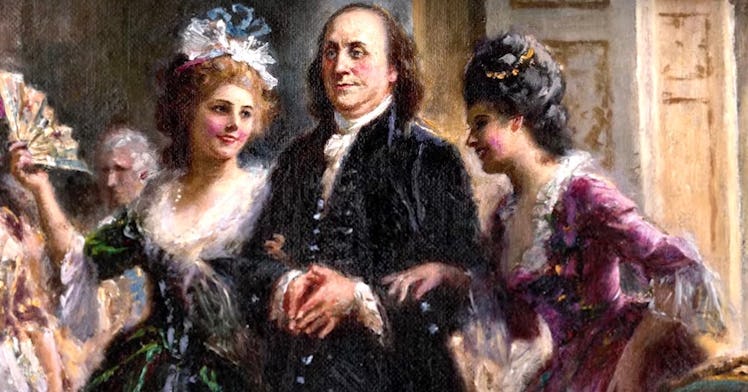Ken Burns’ Documentary Reveals Benjamin Franklin Was Not a Great Dad
On PBS, it's all about that Benjamin.

What do you know about Benjamin Franklin, other than some weird anecdotes about kites and the fact that he’s on the hundred-dollar bill? If the answer is “not much,” this new PBS documentary is worth a look. “I would rather have it said,” Benjamin Franklin once wrote, “”He lived usefully’ than, ‘He died rich.'”
This sentiment pretty much sums-up Franklin’s life, who gets the Ken Burns treatment in the award-winning documentarian’s latest work, the simply titled, Benjamin Franklin. Available now on PBS, the documentary runs four hours, spread over two parts, titled “Join or Die” and “An American.” Burns explores Franklin’s full story, from his birth and childhood in Boston to his many years in Philadelphia to his time in England, and explores his life, career(s), and legacy as a printer, publisher, inventor, scientist, diplomat, politician, revolutionary, slave owner and, later, abolitionist, Founding Father (after having supported the British Empire), husband, and dad. As one might expect, there was much more to the man than what we first learned as kids through illustrated children’s books that told the story of him using a kite and key to confirm that lightning is, in fact, electricity, and led him to create the lightning rod.
Benjamin Franklin presented challenges for Burns that he has faced several times over the course of his 40 or so documentaries. First and foremost, Franklin lived and died in the 18th century, specifically from 1706 to 1790. So, there are no videos, no photographs, no film footage, no audio, no friends or family to serve as talking heads, all of which lent narrative and visual heft to such other Burns documentaries as Frank Lloyd Wright, Baseball, The Vietnam War, Country Music, and The Central Park Five. Burns works around that by calling upon more historians than usual here and letting his camera linger longer on paintings, animations, historical sites, and the like. Another wise decision made here by Burns is keeping Benjamin Franklin to a tight – for him – four-hour running time. Further, he lets Franklin convey much of his own tale, with a fully committed Mandy Patinkin breathing life into the prolific Franklin’s writings. And, fortunately, Franklin wrote beautifully, with a keen grasp of humor, the dramatic, self-awareness, and history.
In addition to Patinkin, Benjamin Franklin benefits from the participation of Peter Coyote, a Burns regular (The National Parks, The Roosevelts: An Intimate History, Hemingway, etc.), who authoritatively narrates the documentary; Josh Lucas as Franklin’s son, William; Liam Neeson as a member of the House of Commons; and Paul Giamatti as John Adams. History buffs will recall that Giamatti won an Emmy Award for his portrayal of America’s second President in the 2008 HBO miniseries, John Adams. More than anything else, Benjamin Franklin depicts Franklin as a flawed, human figure. He was smart, bold, daring, funny, and a shrewd politician. And his personal life was scandalous, specifically when it came to his son. That son, William, had a mother who was not Franklin’s wife. Eventually, he and William clashed and the elder Franklin never let it go.
For a man so capable and willing to adapt and grow and change, his fraught relationship with William is quite surprising. He could broker peace between nations, but not with his kid. That last point is emblematic of the entire production and, apparently, the man himself. Burns presents Franklin as decent but imperfect, and full of contradictions, much like the great nation he helped establish, believed in, and sought to improve.
Benjamin Franklin is available now on PBS stations across the country and on PBS.org.